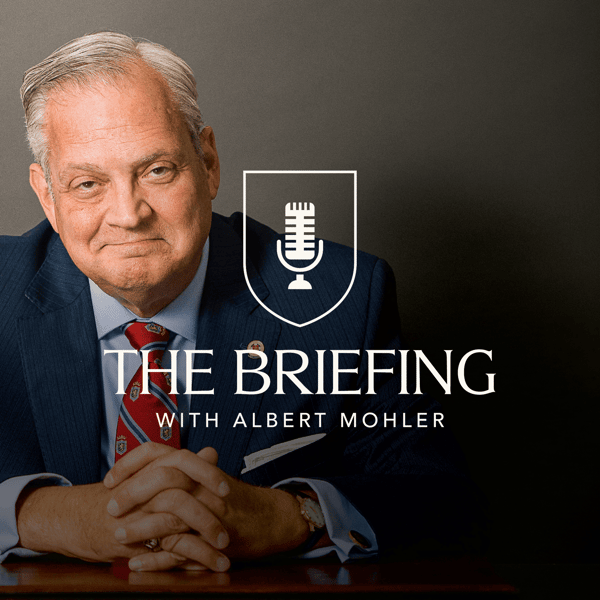Thursday, March 27, 2025
The Briefing with Albert Mohler
The Southern Baptist Theological Seminary
4.8 • 7.9K Ratings
🗓️ 27 March 2025
⏱️ 26 minutes
🧾️ Download transcript
Summary
Part I (00:13 - 15:25)
The Religious Switching in a Secular Age: The Velocity of Secularization Shows in the Numbers
- Around the World, Many People Are Leaving Their Childhood Religions by Pew Research Center (Kirsten Lesage, Kelsey Jo Starr, and William Miner)
Part II (15:25 - 19:20)
Seismic Shifts on the Spiritual Landscape Are Global: And American Exceptionalism May Disappear Fast
Part III (19:20 - 26:22)
Calling Dr. Oz: Dr. Mehmet Oz Needs to Clarify Where He Stands on Transgender Issues and Abortion—and Answer Questions from Sen. Hawley
- GOP senator says Dr Oz ignored his questions on transgender issues, abortion by Fox News (Julia Johnson)
Sign up to receive The Briefing in your inbox every weekday morning.
Follow Dr. Mohler:
X | Instagram | Facebook | YouTube
For more information on The Southern Baptist Theological Seminary, go to sbts.edu.
For more information on Boyce College, just go to BoyceCollege.com.
To write Dr. Mohler or submit a question for The Mailbox, go here.
Transcript
Click on a timestamp to play from that location
| 0:00.0 | It's Thursday, March 27, 2025. I'm Albert Motler, and this is The Briefing, a daily analysis of news and events from a Christian worldview. |
| 0:14.5 | The Pew Research Center is out with a big report on switching in religion. Now, it's a global report, at least inclusive of much of the world, |
| 0:23.2 | but of course we're most interested in what's happening here in the United States. The headline |
| 0:28.2 | from the Pew Center itself says this, quote, around the world, many people are leaving their |
| 0:32.9 | childhood religions. The next subhead, quote, surveys in 36 countries find that Christianity and Buddhism |
| 0:39.9 | have the biggest losses from religious switching. All right. As we as Christians are |
| 0:47.2 | considering this, we understand that this really isn't big news, but it is interesting. It is a |
| 0:53.1 | material interest because we are looking at |
| 0:55.8 | individuals, understanding that every single one of those lives is important to us. We are looking |
| 1:00.7 | at trends, and we understand that this trend is not something that just developed. It's not something |
| 1:05.0 | that just arrived on the horizon, just showed up on the screen. This has been around for a long time. |
| 1:12.0 | And thus, when you look at the category of religious switching here, it's defined as, quote, a change between the religious group |
| 1:17.5 | in which a person says they were raised during their childhood and their religious identity now in |
| 1:22.5 | adulthood. We shouldn't be at all surprised that a lot of switching is going on. And in particular, in a country like the United States, in a society on both sides of the Atlantic, in the English-speaking world, in the larger American and European worlds, we understand that the process of secularization is now quite advanced. |
| 1:41.4 | It's been going on now for more than a couple of generations. It has been |
| 1:45.3 | accelerating because this is how social trends work. But we're also looking at two interesting |
| 1:50.6 | things. The Pew Center comes back and tells us the two religions that are suffering the most |
| 1:55.8 | from disaffiliation, that is, persons who said they were raised in, say, a Christian home, and they were raised in a |
| 2:03.6 | Christian identity, but now they have disaffiliated from Christianity. The fact that it's Christianity |
| 2:08.3 | and Buddhism in respective places in terms of concentration around the globe, the fact that |
| 2:14.3 | those two are singled out, that also tells us something, but it's not exactly the same thing. |
| 2:17.9 | So let's think about what we're talking about here. Number one, we're most interested in Christianity, |
... |
Please login to see the full transcript.
Disclaimer: The podcast and artwork embedded on this page are from The Southern Baptist Theological Seminary, and are the property of its owner and not affiliated with or endorsed by Tapesearch.
Generated transcripts are the property of The Southern Baptist Theological Seminary and are distributed freely under the Fair Use doctrine. Transcripts generated by Tapesearch are not guaranteed to be accurate.
Copyright © Tapesearch 2025.

